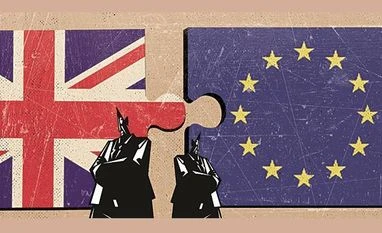It is true that Norway and Switzerland, both of which are highly integrated into the EU market, have customs borders with the bloc. These countries need an independent commercial policy to provide greater protection than the EU offers to their domestic agricultural sectors, which in both cases can never be efficient, owing to mountainous terrain.
Yet the UK has traditionally been much less protective of its agriculture, and is thus likely after Brexit to pursue a commercial policy that is very similar to that of the EU, anyway. It is therefore difficult to see what the UK would gain from pursuing a national trade policy — especially at a time when the United States, under President Donald Trump, is pursuing policies (such as imposing tariffs on imported steel and aluminium) that show little regard for its smaller trade partners.
The truth is that the main impediment to a post-Brexit customs union is political. As Labour leader Jeremy Corbyn, who supports remaining in the customs union, has emphasised, a country with the heft and influence of the UK cannot be viewed as merely following EU decisions, over which it has no influence. Yet this problem can be solved — or, rather, finessed.
Illustration by Ajay Mohanty
Formal decision-making power is of course another matter. The EU’s legal structure cannot allow a non-member state to participate in binding decisions. This calls for something of a gentlemen’s agreement, with the EU pledging to take UK interests into account when making trade-policy decisions.
If the UK remains in the existing EU customs union — as is foreseen for the transition period — rather than negotiating a new customs agreement with the EU, that gentlemen’s agreement would also extend to new trade agreements that the EU concludes with third countries. After all, such agreements would apply explicitly to the EU’s entire customs territory — a term with a precise meaning under World Trade Organization, or WTO, rules. So, whatever market-access benefits they include would automatically apply to the UK.
As a gesture of goodwill, the EU should also support the UK’s efforts to “grandfather” its market access resulting from existing EU free-trade agreements and thereby avoid the need to renegotiate each and every deal. The legal argument would be that the EU customs territory has not changed, so existing EU trade agreements must continue to apply to the UK. But this argument could be contested, leaving UK exporters suddenly confronting tariffs and other trade barriers.
European Commission officials could dismiss that as the UK’s problem. But such a response would run counter to the spirit of the European Council guidelines of April 2017, which call for “a constructive dialogue” with the UK “on a possible common approach toward third-country partners.” Such a constructive approach would include steps — like supporting the grandfathering of trade agreements — that minimise friction during the transition period.
Remaining in the EU’s customs union would leave the UK in a much stronger position than, say, Turkey, which, despite having concluded an agreement to create a customs union with the EU, is not actually part of the bloc’s customs territory. As a result, third parties do not automatically have to grant Turkish exporters EU-level access to their markets. Instead, Turkey must try to persuade third countries with which the EU has concluded trade deals to do so.
Turkey has usually succeeded. But it enters such negotiations in a weak and somewhat awkward position, because it is required, per its agreement with the EU, to grant to the third country all of the concessions the EU has made, whereas the third country has no legal or political obligation to reciprocate.
For the EU, agreeing to take the UK’s interests into account in future trade negotiations should not be viewed as a concession, because it is in the EU’s own long-term interest. After all, if the EU can offer de facto access to the EU and UK markets — which, together, are 20 per cent larger than the EU market alone — its negotiating power is significantly strengthened.
In this sense, keeping the UK in the EU customs union would help to preserve the EU’s global standing in trade. And while many in the EU, especially the European Commission, would like to have their cake and eat it — keeping the UK in the customs union, while ignoring its interests — that is simply not an option.
The alternatives available for the EU is either to see the UK to leave its customs union, or to keep the UK in, by making a political commitment to take British interests into account. From a long-term perspective, the latter is preferable.
Finally, remaining in the EU customs union would make it possible to avoid reestablishing a hard border between the UK and the Republic of Ireland after Brexit. Though May has agreed that avoiding a hard border should be part of any deal, she has offered only vague suggestions concerning how that could actually be achieved.
Brexit is, and will remain, a lose-lose proposition. Neither side can claim victory if its point of view prevails. But the losses on both sides can be reduced. To that end, keeping the UK in the EU customs union — by guaranteeing it an active, albeit informal role — is negotiators’ best bet.
The writer is director of the Center for European Policy Studies. ©Project Syndicate, 2018
www.project-syndicate.org
www.project-syndicate.org
)